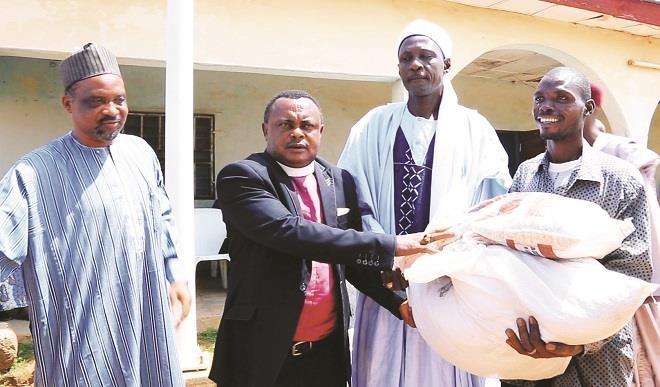4,150 displaced farmers get seeds in Adamawa
As part of the humanitarian relief services to support the Internally Displaced Persons (IDPs) in the North-east, USAID in partnership with American University of Nigeria (AUN)-API has selected 4,150 farmers across four local governments in Adamawa State to benefit from their food security initiatives. The farmers, who are indigenes of Gombi, Fufore, Michika and Madagali […]


As part of the humanitarian relief services to support the Internally Displaced Persons (IDPs) in the North-east, USAID in partnership with American University of Nigeria (AUN)-API has selected 4,150 farmers across four local governments in Adamawa State to benefit from their food security initiatives.
The farmers, who are indigenes of Gombi, Fufore, Michika and Madagali received bags of seeds and food to aid their recovery from the destruction of their communities and livelihoods by insurgency.
Each farmer got 10kg of maize, 10kg of cowpea and 5kg of sorghum for planting, and in order not to convert the seeds for consumption, the farmers were given additional 20kg bags of maize, 10kg bags of beans and a token for transportation back to their destinations, a statement from the AUN said.
The seeds, which were supplied by USAID, are said to be high yielding and require minimal fertilizer. About 50,000 households were said to have benefited from the exercise.
The coordinator of AUN-API Humanitarian Relief, Bello Abdullahi, who expressed satisfaction with the turnout of IDPs farmers and their orderly conduct, said USAID preferred AUN-API to handle the distribution on its behalf because the organisation enjoyed grassroots support and the trust of local farmers.
AUN, he said, had a founding mandate to ‘light a candle rather than cause the darkness’, adding that it worked in and with the community to find solutions to challenges faced by its people.
However, some of the beneficiaries, who spoke on the initiatives, said it was a relief and a step towards motivating them to getting back to their livelihoods.
Aisha Malafa, a farmer from Guyaku District, Gombi Local Government, who narrated their ordeal in the hands of Boko Haram and how they lost their relatives, home and farms, said it had not been easy for them since they returned.
Malafa said: “What these organisations are doing will help us. We will be able to plant our seeds and grow something.”
She, however, called on more well-meaning Nigerians and organisations to come to their aid, saying they need more of such assistance.
Another beneficiary, Pastor Mark Nuhu, also from Gombi, said life had been difficult since his house was burnt and he was unable to rebuild it due to lack of money.
Nuhu said the seeds he received from the organisation, it would help him to get back on track.
“I will get produce and by the end of the day, I will have something to live on. This is a sign of hope. I pray that God will increase them as they are increasing us,” he said.
